THE University of Wollongong (UOW) Malaysia has become the first university in Southeast Asia to join Intel’s University Shuttle Programme.
This programme, renowned for fostering industry-academia collaboration, provides students and faculty with access to advanced semiconductor technologies, enabling them to engage in cutting-edge research and development projects. Other institutions in the programme include the University of Michigan, the University of California, Berkeley, and several universities in South Korea.
The strong collaboration between UOW Malaysia (UOW M) and Intel Malaysia also marks the establishment of the UOW M-Intel IC Design Centre of Excellence at UOW Malaysia’s Batu Kawan campus.
This morning, Intel Malaysia and UOW Malaysia signed a Memorandum of Understanding (MoU) to grant the university and its affiliate campuses access to Intel’s process design kit (PDK), along with tools and resources to facilitate the design and verification of integrated circuits (ICs) using Intel’s process technology.
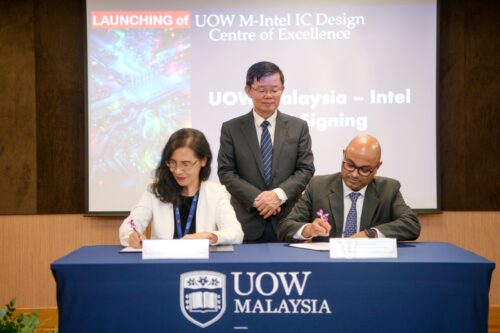
The PDK includes essential components for IC design, ensuring the designs meet manufacturing constraints and are optimized for performance, reliability, and manufacturability.
Students will use the PDK to design ICs, which Intel is expected to produce as test chips, offering a unique real-world learning experience for programme participants.
Intel Corporation vice-president and Client Computing Group general manager of Malaysia Design Centre Suresh Kumar Dass highlighted the significance of this collaboration, noting that the initiative began over a year ago with the establishment of non-disclosure agreements and the mechanics of delivery.
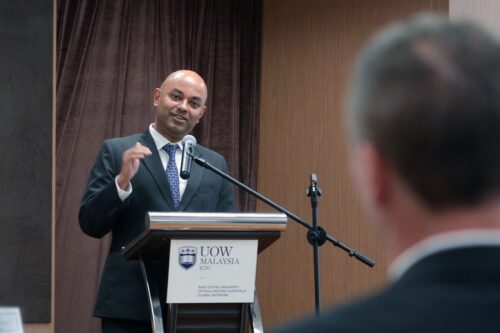
“I am happy and excited to partner with UOW Malaysia. Starting today, we will see this work that we are doing together to build talent in Malaysia accelerate,” he said.
Prof Christian Ritz, Dean of Global Academic Affairs of UOW Global Enterprises, emphasised the partnership’s role in supporting advanced education, research, and innovation in IC design, which is crucial in the current technological landscape.
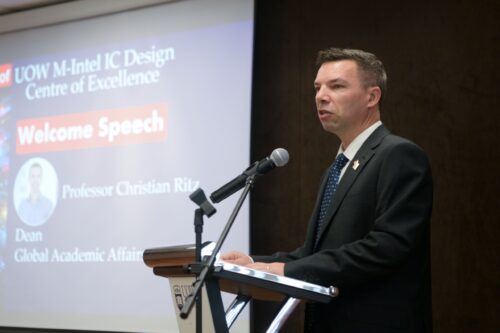
Chief Minister Chow Kon Yeow remarked that the partnership is about more than building a state-of-the-art centre; it is about preparing students for the digital economy of tomorrow.
“As technology transforms industries worldwide, it is crucial that education keeps pace,” he stated.
He highlighted the global semiconductor market’s growth potential, valued at approximately US$574 billion in 2022 and expected to reach around US$1 trillion by 2030, growing at a compound annual growth rate (CAGR) of about 7%.
Chow praised Intel’s University Shuttle Programme, calling it a launchpad for integrating cutting-edge technology and real-world applications into the curriculum, offering students hands-on experience that textbooks cannot provide.
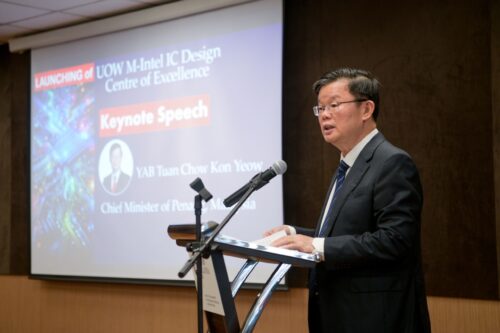
He stressed that Penang, with Malaysia’s most comprehensive semiconductor ecosystem, is actively working with the Federal Government to attract investments in the semiconductor industry, particularly in IC design.
“We are optimistic about reaching the Federal Government’s investment target of RM367.8 billion for the Northern Corridor Economic Region (NCER) by 2030,” Chow added.
He pointed out that Penang’s electrical and electronics (E&E) sector, which contributes over 50% of Malaysia’s E&E exports, plays a pivotal role in achieving this target.
Chow also highlighted initiatives such as the Penang Chip Design Academy and the IC Design and Digital Park, which exemplify Penang’s commitment to cultivating talent and driving growth in STEM (Science, Technology, Engineering, and Mathematics) fields.
“Led by the Penang Skills Development Centre (PSDC) in collaboration with industry leaders, Electronic Design Automation (EDA) tool providers, academia, and InvestPenang, the Academy focuses on comprehensive design development,” he said.
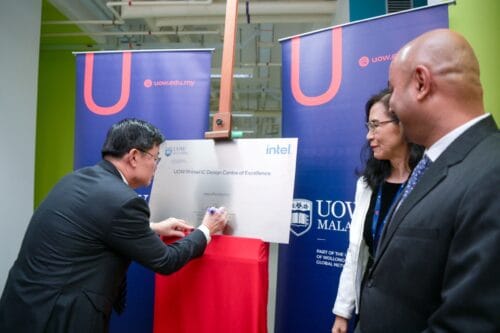

He explained that the IC Design and Digital Park offers a collaborative space for startups, established companies, and academic institutions to innovate and advance IC design technologies.
By providing access to the latest tools and resources, the Digital Park ensures that Penang remains at the forefront of technological development and attracts top-tier investment from global tech giants.
“Through such efforts, I am optimistic that Penang is set to become a beacon of technological excellence and a prime destination for cutting-edge research and development, solidifying its reputation as the Silicon Valley of the East.
“This dynamic environment will undoubtedly benefit students and professionals alike, positioning them to thrive in the ever-evolving digital landscape,” Chow concluded.
Also present were InvestPenang chief executive officer Datuk Loo Lee Lian, UOW Global Enterprises (Asia) chief executive officer Jennifer Ng Glok-Hong, UOW Dubai president Prof Mohamed-Vall M. Salem, and UOW Malaysia KDU Penang University College vice-chancellor Prof Dr Chong Beng Keok.
Story by Christopher Tan
Pix by Siew Chia En
Video by Law Suun Ting

